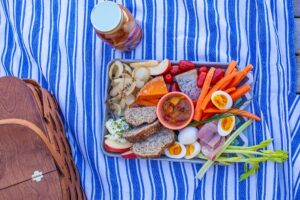I’m driving home to Truro from the hardware store in Provincetown when I see the poster-waving crowd on Route 6 across from the fire station. Maybe I’m going a tiny bit over the speed limit; I only get a glimpse. I can see that one sign says “TRURO” in large letters followed by a big sad face and lots of handwriting that looks unhappy, too. Another sign says something about the DPW and I make out the word “corruption.”
I used to love town meeting. That very first year that we were finally putting down roots here, I was thrilled — moved, even — to hold aloft my little pale-blue voter card in 2018. I still have it tacked to the refrigerator. This year, we’ll go, of course, to the much-anticipated annual and several-times-delayed special town meetings. But instead of being excited about it, I feel exhausted already by the ill will that’s in the air.

There were always a few colorful people going off in what seemed to me to be weird directions at town meeting; that’s part of the New England experience, after all. But mostly people stood up to express their opinions with both conviction and civility. I felt proud to be participating in a historic example of direct democracy. That was then. These days a disheartening malignity and even the language of conspiracy theorists seems to have found a foothold here.
So, as Christopher and I ready ourselves for the meeting, we have democracy on our minds, but being an ever-practical couple, we are also thinking about survival tactics — in particular, lunch.
Registration starts at 8 a.m. on Saturday, May 4, and the meeting will go from 10 a.m. until who-knows-when. Then we start all over again on Sunday. This stretch covers quite a few meals. And nothing good can come from a combination of too many procedural motions and hunger.
I’m pretty sure that keeping to our best democratic intentions is going to require attention to food and drink. Perhaps to mitigate the risk of civic hangryness, the town should distribute satisfying noshes with each voter card. But I don’t think anti-hangry funds have been budgeted, so I’m planning our town meeting picnic basket now.
A civic-minded basket, it seems to me, should be packed with foods that can be easily eaten in public. Things that aren’t messy. Things that aren’t smelly. We’ll want food that is satisfying and that can be noshed on over the course of the day, whenever the spirit moves and the stomach growls.
The English ploughman’s lunch comes to mind: an assembly of things like sturdy cheeses (usually cheddar), pickled onions or gherkins, chutney, ham or paté, hard-boiled eggs, apples, mustard, and crusty bread with butter.
There’s something about the simplicity of a ploughman that seems just right for the exercise of direct democracy. The words “ploughman’s lunch” were co-opted for marketing pub lunches in the 1960s, but the tradition is certainly real, that of farmers carrying their lunches into the fields. I realize I’m indulging in nostalgia here, but I like to think of the elements of a ploughman’s lunch standing for all that is savory about ordinary people doing the ordinary if hard work of keeping things running, whether by farming or governing.

Our menu will be assembled with what we can buy locally or already have on hand. We don’t have cheddar, though that would surely be on our plates at an English pub. But an aged and caramel-y mimolette will do. Plus a wedge of Gruyère and one of St. Agur, a soft and creamy blue. I’ll knead some of the chives pushing up in the garden into a knob of good butter. A neighbor’s chickens provide eggs that I’ll boil until the yolks are just set. I know PB Boulangerie will have a multi-grain bâtard. I’ll add some tender hearts of celery and carrot sticks, some slices of ham, an apple, and some pickled tomatoes I made in the fall.
A ploughman’s lunch traditionally includes a dollop of Branston Pickle, a version of chutney made with rutabagas and dates, but it’s not easy to find on the Outer Cape. I do have a jar of Major Grey’s chutney, made with mangoes and ginger, that someone gave us — so, however nontraditional, into the ploughman it goes.
And since beer, the traditional accompaniment to this lunch, is probably not a good idea for town meeting, I’m going to use an IPA to make quick-pickled onions with a recipe adapted from British chef Paul Foster.
It doesn’t take a culinary genius to put together a lunch of cheeses, bread, and pickles. But maybe it will help us keep in mind that things — even civic life — can be satisfyingly complex, crusty, rich, spicy, crunchy, and chewy without being all that complicated.
ONIONS PICKLED WITH BEER
4 large onions
4¼ cups bitter beer (about 3 bottles)
2¼ cups unseasoned rice wine vinegar
¾ cup Demerara (or turbinado) sugar
4 Tbsp. honey
20 juniper berries
8 sprigs of fresh thyme
- bay leaves
- Peel the onions and cut into quarters. Break each quarter down into petals by separating the individual layers.
- Combine the beer, vinegar, sugar, honey, juniper, thyme, and bay leaves in a saucepan and bring to a boil. Add the onions and remove from heat.
- Cover tightly to allow the onions to steam and soften slightly in the liquid. Leave the onions to cool in the liquid before serving at room temperature. Can be kept refrigerated for a couple of weeks.



